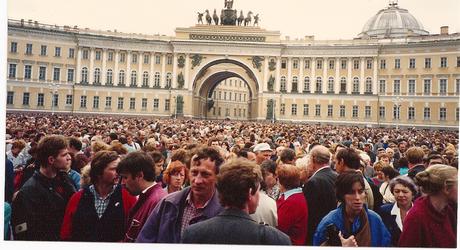Jennifer Wilson
New Jersey
Other/Almost
I was studying in St. Petersburg, Russia (then Leningrad) in August of 1991, having just celebrated my 19th Birthday singing Beatles songs with my new Russian and other expat friends when the Soviet Coup D'etat attempt broke out. I was living with a Russian family in a former communal apartment building in downtown Leningrad only a few blocks from the Winter Palace and Nevsky Prospect. I had just returned from spending the weekend in Moscow, where there were no visible signs of unrest. We took the overnight train back to St. Petersburg to learn that the Coup had broken out overnight. My Russian host family invited me into their room, which they had never done before, to watch the news. We were told the old Soviet line that Gorbachev was sick and was taken to the south for recovery, that there were tanks and soldiers in Red Square and that demonstrations were being organized for the Palace Square. The news also reported that the airports were closed and that the phone lines were down. There was no way to get out of the country. My host family told me that I should go to the U.S. Consulate. The subways were still working, even though there was a workers strike, so I went to my language school and found some other students there. I was frightened and exhilarated at the same time. We took a cab to the Consulate to register. I had never felt so patriotic in my life at the sight of that oversized American flag billowing in the wind outside of the Consulate. Inside, the soldiers acted as if nothing was happening outside and simply gave us registration forms to fill out and we were told not to leave the city. We were very matter-of-factly told that the government would get us out if they needed to. This was reassuring, but disappointing. I had somehow expected to be greeted with open arms, enveloped like a child into the strong arms of America, offered a cold diet coke and an open line to call home to my mother, who was certainly worried to death. That didn't happen. I think I grew up a lot in those few minutes.
I was young and naive. I had never been outside of the U.S. before and my understanding of revolution came from my AP American History class. But within the course of 24-48 hours I understood why people rise up. The Russian soul had been beaten down for centuries and you could see it in their faces, in their demeanor, and in their resignation to trudge through daily life without complaint and, moreover, without any great expectation of happiness. Russians were tough, they had proven that they could endure anything and survive, but they had had enough. And there I was marching along side of them, chanting with them, taking a stand against the Soviets and finding my own inner strength along the way.
